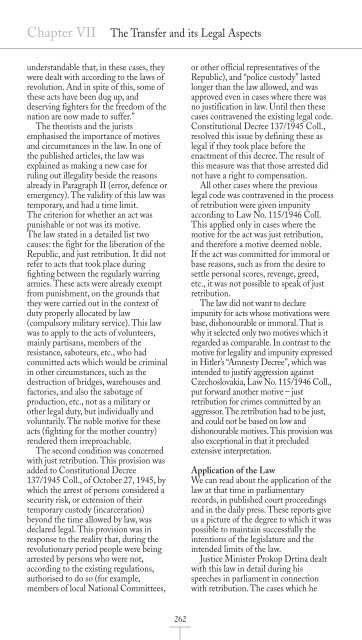the nationality of all inhabitants of the czech provinces and ...
the nationality of all inhabitants of the czech provinces and ...
the nationality of all inhabitants of the czech provinces and ...
Create successful ePaper yourself
Turn your PDF publications into a flip-book with our unique Google optimized e-Paper software.
Chapter VII The Transfer <strong>and</strong> its Legal Aspects<br />
underst<strong>and</strong>able that, in <strong>the</strong>se cases, <strong>the</strong>y<br />
were dealt with according to <strong>the</strong> laws <strong>of</strong><br />
revolution. And in spite <strong>of</strong> this, some <strong>of</strong><br />
<strong>the</strong>se acts have been dug up, <strong>and</strong><br />
deserving fighters for <strong>the</strong> freedom <strong>of</strong> <strong>the</strong><br />
nation are now made to suffer.”<br />
The <strong>the</strong>orists <strong>and</strong> <strong>the</strong> jurists<br />
emphasised <strong>the</strong> importance <strong>of</strong> motives<br />
<strong>and</strong> circumstances in <strong>the</strong> law. In one <strong>of</strong><br />
<strong>the</strong> published articles, <strong>the</strong> law was<br />
explained as making a new case for<br />
ruling out illegality beside <strong>the</strong> reasons<br />
already in Paragraph II (error, defence or<br />
emergency). The validity <strong>of</strong> this law was<br />
temporary, <strong>and</strong> had a time limit.<br />
The criterion for whe<strong>the</strong>r an act was<br />
punishable or not was its motive.<br />
The law stated in a detailed list two<br />
causes: <strong>the</strong> fight for <strong>the</strong> liberation <strong>of</strong> <strong>the</strong><br />
Republic, <strong>and</strong> just retribution. It did not<br />
refer to acts that took place during<br />
fighting between <strong>the</strong> regularly warring<br />
armies. These acts were already exempt<br />
from punishment, on <strong>the</strong> grounds that<br />
<strong>the</strong>y were carried out in <strong>the</strong> context <strong>of</strong><br />
duty properly <strong>all</strong>ocated by law<br />
(compulsory military service). This law<br />
was to apply to <strong>the</strong> acts <strong>of</strong> volunteers,<br />
mainly partisans, members <strong>of</strong> <strong>the</strong><br />
resistance, saboteurs, etc., who had<br />
committed acts which would be criminal<br />
in o<strong>the</strong>r circumstances, such as <strong>the</strong><br />
destruction <strong>of</strong> bridges, warehouses <strong>and</strong><br />
factories, <strong>and</strong> also <strong>the</strong> sabotage <strong>of</strong><br />
production, etc., not as a military or<br />
o<strong>the</strong>r legal duty, but individu<strong>all</strong>y <strong>and</strong><br />
voluntarily. The noble motive for <strong>the</strong>se<br />
acts (fighting for <strong>the</strong> mo<strong>the</strong>r country)<br />
rendered <strong>the</strong>m irreproachable.<br />
The second condition was concerned<br />
with just retribution. This provision was<br />
added to Constitutional Decree<br />
137/1945 Coll., <strong>of</strong> October 27, 1945, by<br />
which <strong>the</strong> arrest <strong>of</strong> persons considered a<br />
security risk, or extension <strong>of</strong> <strong>the</strong>ir<br />
temporary custody (incarceration)<br />
beyond <strong>the</strong> time <strong>all</strong>owed by law, was<br />
declared legal. This provision was in<br />
response to <strong>the</strong> reality that, during <strong>the</strong><br />
revolutionary period people were being<br />
arrested by persons who were not,<br />
according to <strong>the</strong> existing regulations,<br />
authorised to do so (for example,<br />
members <strong>of</strong> local National Committees,<br />
262<br />
or o<strong>the</strong>r <strong>of</strong>ficial representatives <strong>of</strong> <strong>the</strong><br />
Republic), <strong>and</strong> “police custody” lasted<br />
longer than <strong>the</strong> law <strong>all</strong>owed, <strong>and</strong> was<br />
approved even in cases where <strong>the</strong>re was<br />
no justification in law. Until <strong>the</strong>n <strong>the</strong>se<br />
cases contravened <strong>the</strong> existing legal code.<br />
Constitutional Decree 137/1945 Coll.,<br />
resolved this issue by defining <strong>the</strong>se as<br />
legal if <strong>the</strong>y took place before <strong>the</strong><br />
enactment <strong>of</strong> this decree. The result <strong>of</strong><br />
this measure was that those arrested did<br />
not have a right to compensation.<br />
All o<strong>the</strong>r cases where <strong>the</strong> previous<br />
legal code was contravened in <strong>the</strong> process<br />
<strong>of</strong> retribution were given impunity<br />
according to Law No. 115/1946 Coll.<br />
This applied only in cases where <strong>the</strong><br />
motive for <strong>the</strong> act was just retribution,<br />
<strong>and</strong> <strong>the</strong>refore a motive deemed noble.<br />
If <strong>the</strong> act was committed for immoral or<br />
base reasons, such as from <strong>the</strong> desire to<br />
settle personal scores, revenge, greed,<br />
etc., it was not possible to speak <strong>of</strong> just<br />
retribution.<br />
The law did not want to declare<br />
impunity for acts whose motivations were<br />
base, dishonourable or immoral. That is<br />
why it selected only two motives which it<br />
regarded as comparable. In contrast to <strong>the</strong><br />
motive for legality <strong>and</strong> impunity expressed<br />
in Hitler’s “Amnesty Decree”, which was<br />
intended to justify aggression against<br />
Czechoslovakia, Law No. 115/1946 Coll.,<br />
put forward ano<strong>the</strong>r motive – just<br />
retribution for crimes committed by an<br />
aggressor. The retribution had to be just,<br />
<strong>and</strong> could not be based on low <strong>and</strong><br />
dishonourable motives. This provision was<br />
also exceptional in that it precluded<br />
extensive interpretation.<br />
Application <strong>of</strong> <strong>the</strong> Law<br />
We can read about <strong>the</strong> application <strong>of</strong> <strong>the</strong><br />
law at that time in parliamentary<br />
records, in published court proceedings<br />
<strong>and</strong> in <strong>the</strong> daily press. These reports give<br />
us a picture <strong>of</strong> <strong>the</strong> degree to which it was<br />
possible to maintain successfully <strong>the</strong><br />
intentions <strong>of</strong> <strong>the</strong> legislature <strong>and</strong> <strong>the</strong><br />
intended limits <strong>of</strong> <strong>the</strong> law.<br />
Justice Minister Prokop Drtina dealt<br />
with this law in detail during his<br />
speeches in parliament in connection<br />
with retribution. The cases which he


